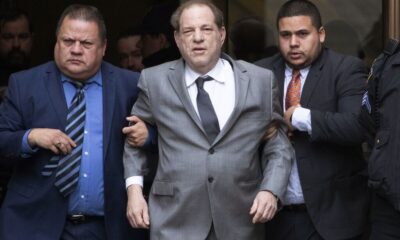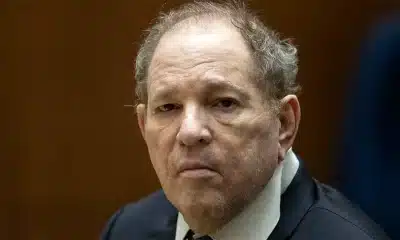Celebrity
Harvey Weinstein’s 2020 Rape Conviction Overturned By NY Appeals Court

New York – The highest court in New York overturned Harvey Weinstein’s rape conviction in 2020. This decision reversed a significant ruling from the #MeToo era, as it found that the trial judge had made an error by allowing women to testify regarding charges against Weinstein that were not relevant to the case.
Weinstein, aged 72, will continue to be incarcerated as he was found guilty of a further rape in Los Angeles in 2022. However, the recent verdict in New York brings back a distressing period in America’s confrontation with sexual misbehavior committed by influential individuals. This era commenced in 2017 when numerous accusations against Weinstein emerged.
The Manhattan district attorney’s office indicated its determination to pursue a new trial for Weinstein, perhaps requiring his accusers to once again recount their experiences under oath.
In a 4-3 judgment, the California Court of Appeals reversed Weinstein’s 23-year sentence, stating that the trial court made a mistake by allowing testimony about uncharged, alleged previous sexual actions involving individuals other than the victims of the offenses in question. The majority of the court deemed this as a “misuse of judicial discretion.”
Judge Madeline Singas expressed strong disapproval in her dissent, stating that the Court of Appeals was persisting in a troubling pattern of reversing juries’ guilty verdicts in cases related to sexual violence.
Weinstein has been incarcerated in a New York correctional facility following his conviction for engaging in non-consensual oral sex with a TV and film production assistant in 2006 and for committing third-degree rape against an aspiring actress in 2013. In the Los Angeles case, he received a 16-year prison sentence.
Arthur Aidala, the lawyer representing Weinstein, described the verdict by the Court of Appeals as a significant triumph for all individuals accused of crimes in New York state.
The office of the Manhattan district attorney expressed its commitment to make every effort to retry this case.
AP – VOR News Image
Harvey Weinstein’s 2020 Rape Conviction Overturned By NY Appeals Court
Lawyer Douglas H. Wigdor, who has legally represented eight individuals accusing Harvey Weinstein, including two witnesses in the New York criminal prosecution, described the ruling as “a significant regression in ensuring that those responsible for acts of sexual violence are held accountable.”
“Courts frequently allow the introduction of evidence regarding additional acts that the defendant has not been charged with, if it helps the jury to comprehend matters related to the defendant’s intention, method of operation, or overall plan.” Wigdor stated that overturning the verdict would be unfortunate because it would necessitate the victims to go through another trial, after the jury was informed of the importance of this testimony.
Debra Katz, a well-known lawyer specializing in civil rights and #MeToo cases, who advocated for multiple accusations of Weinstein, expressed that her clients are deeply devastated by the decision. However, she firmly believed and assured them that their testimonies had a profound impact on society.
“Individuals persist in stepping forward, individuals persist in providing assistance to other victims who have reported instances of sexual assault and violence, and I firmly believe that there is no possibility of reverting from this progress,” Katz stated, foreseeing Weinstein’s conviction at a subsequent trial.
She stated that the women derive immense solace from the fact that Weinstein will continue to be incarcerated.
The overturning of Weinstein’s conviction is the second significant setback for the #MeToo movement in the past two years, following the U.S. Supreme Court’s rejection of an appeal to reinstate Bill Cosby’s conviction for sexual assault, as ruled by a Pennsylvania court.
Weinstein’s conviction endured for almost four years, celebrated by activists and advocates as a significant accomplishment, but promptly scrutinized by his lawyers and, subsequently, by the Court of Appeals during the February hearings.
The accusations against Weinstein, the formerly influential and intimidating studio executive responsible for acclaimed films like “Pulp Fiction” and “Shakespeare in Love,” marked the beginning of the #MeToo movement. A multitude of women, including renowned actresses like Ashley Judd and Uma Thurman, stepped forward to accuse Weinstein. The New York trial he was involved in garnered significant media attention, with demonstrators outside the courthouse vocally accusing him of being a rapist.
AP – VOR News Image
Harvey Weinstein’s 2020 Rape Conviction Overturned By NY Appeals Court
Weinstein is currently imprisoned at the Mohawk Correctional Facility in New York, which is located around 100 miles (160 kilometers) northwest of Albany.
He asserts his innocence. He asserts that all sexual activity was consenting.
Aidala contended during the February appeals court hearing that Burke influenced the trial by permitting three women to provide testimony regarding charges that were not relevant to the case and by granting prosecutors the authority to question Weinstein, had he chosen to testify, about his extensive record of aggressive conduct.
Aidala contended that the additional testimony exceeded the usual permissible scope of providing information about purpose, opportunity, intent, or a common scheme or plan. Furthermore, it effectively subjected Weinstein to a trial for offenses for which he was not formally accused.
Weinstein expressed a desire to provide testimony but ultimately decided against it due to Burke’s judgment, which would have required him to answer inquiries regarding over twenty-four reported instances of misconduct spanning a period of forty years. His behavior encompassed engaging in physical altercations with his brother, forcefully overturning a table out of fury, berating waitstaff, and shouting at his subordinates.
An attorney representing the Manhattan district attorney’s office, responsible for prosecuting the case, contended that the judge’s decisions were appropriate and that the additional evidence and testimony he permitted were crucial in offering jurors a comprehensive understanding of Weinstein’s conduct and his interactions with women.
According to Appellate Chief Steven Wu, Weinstein’s acquittal on the charges of predatory sexual assault and first-degree rape, specifically related to actor Annabella Sciorra’s allegations of rape in the mid-1990s, indicates that the jurors were attentive and not confused or overwhelmed by the additional testimony.Typically, the Associated Press does not reveal the identities of individuals who claim to be victims of sexual assault unless they give their permission to be named. However, Sciorra has chosen to discuss her allegations publicly.
AP – VOR News Image
Harvey Weinstein’s 2020 Rape Conviction Overturned By NY Appeals Court
Last year, the Court of Appeals agreed to review Weinstein’s case following a decision by an intermediate appeals court to uphold his conviction.
Before rendering their decision, judges on the lower appellate court had expressed skepticism regarding Burke’s behavior during oral arguments. It was noted that Burke allowed prosecutors to present “highly biased testimony” from extra witnesses.
Burke’s tenure concluded at the conclusion of 2022. He was not renewed in his position and has ceased to hold the role of a judge.
Weinstein’s lawyers filed an appeal specifically requesting a fresh trial just for the charge of criminal sexual act. They contended that the rape case could not be subjected to a new trial due to the alleged behavior falling beyond the legal time limit.
SOURCE – (AP)

































